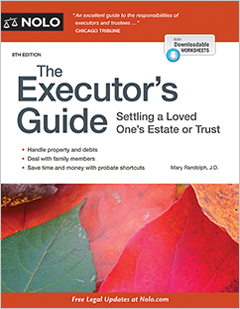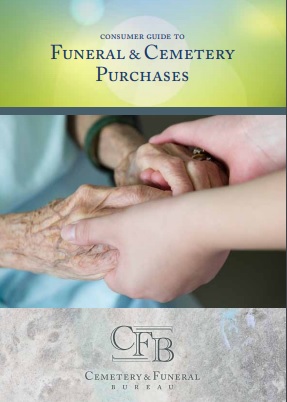What are the duties of the
Executor of a deceased person’s Estate?
Notification 16061.7
Typically, an executor Nolo * Checklist & Notices Kit * must:
- Find the deceased person’s assets and manage them until they are distributed to inheritors.
- Decide whether or not probate court proceedings are needed. (Nolo Probate FAQ.)
- Figure out who inherits property.
- File the will (if any) in the local probate court. Our webpage on finding wills & lost stuff * Nolo Finding and Filing the Will.
- Handle day-to-day details.
- Set up an estate bank account.
- Use estate funds to pay continuing expenses.
- Pay debts. Notice to Creditor of Death.
- Pay taxes.
- Supervise the distribution of the deceased person’s property. White & Williams * Nolo.com
- Place Obituary? Legacy.com
Common pitfalls include …
self-dealing
buying assets for yourself or a family member from the estate or trust, even at market price, American Bar Assoc
the duty of care,
requires a fiduciary to carefully manage trust or estate assets. “prudent investor rule,” which requires a fiduciary to use reasonable care, skill, and caution in managing assets. An executor or administrator is held to a “prudent man” standard, which is lower than a “prudent investor.” Assets must be sold at proper prices and on proper terms.
Duty of Impartiality
A fiduciary must not favor any beneficiary over another. the fiduciary must treat himself no better than any other beneficiary. Lindlaw.com
Beneficiary’s right to know – Notification
CA Probate Code §16060 The trustee has a duty to keep the beneficiaries of the trust reasonably informed of the trust and its administration.
(a) A trustee shall provide a true and complete copy of the terms of the irrevocable trust, or irrevocable portion of the trust, to each of the following:
(1) Any beneficiary of the trust who requests it, and to any heir of a deceased settlor who requests it, when a revocable trust or any portion of a revocable trust becomes irrevocable because of the death of one or more of the settlors of the trust, when a power of appointment is effective or lapses upon the death of a settlor under the circumstances described in paragraph (3) of subdivision (a) of Section 16061.7, or because, by the express terms of the trust, the trust becomes irrevocable within one year of the death of a settlor because of a contingency related to the death of one or more of the settlors of the trust.
“Heir” means any person, including the surviving spouse, who is entitled to take property of the decedent by intestate succession §§6400-6455 under this code. Probate Code 44 *
…The part of the intestate estate not passing to the surviving spouse, under Section 6401, or the entire intestate estate if there is no surviving spouse, passes as follows:
(a) To the issue of the decedent, the issue taking equally if they are all of the same degree of kinship to the decedent §6402 * Nolo *
(a) To the issue of the decedent, the issue taking equally if they are all of the same degree of kinship to the decedent, but if of unequal degree those of more remote degree take in the manner provided in Section 240.
(2) Any beneficiary of the trust who requests it, whenever there is a change of trustee of an irrevocable trust.
(3) If the trust is a charitable trust subject to the supervision of the Attorney General, to the Attorney General, if requested, when a revocable trust or any portion of a revocable trust becomes irrevocable because of the death of one or more of the settlors of the trust, when a power of appointment is effective or lapses upon the death of a settlor under the circumstances described in paragraph (3) of subdivision (a) of Section 16061.7, or because, by the express terms of the trust, the trust becomes irrevocable within one year of the death of a settlor because of a contingency related to the death of one or more of the settlors of the trust, and whenever there is a change of trustee of an irrevocable trust.
(b) The trustee shall, for purposes of this section, rely upon any final judicial determination of heirship. However, the trustee shall have discretion to make a good faith determination by any reasonable means of the heirs of a deceased settlor in the absence of a final judicial determination of heirship known to the trustee.
- §16061.7. (f) The #notification by trustee shall be served not later than 60 days following the occurrence of the event requiring service of the notification by trustee, or 60 days after the trustee became aware of the existence of a person entitled to receive notification by trustee, if that person was not known to the trustee on the occurrence of the event requiring service of the notification.
- How do trust – will beneficiaries get notified? Does the administrator need their tax ID?
- Establish a reliable line of communication with each beneficiary and get his or her address, Social Security number, and birth date. This information will help you properly file taxes and create an appropriate payout schedule for the trust.
- There are no formal steps to follow when notifying beneficiaries
- You need to obtain the beneficiary’s address and Social Security Number (SSN). Beneficiary payments will probably contain elements of taxable income. Because he or she must pay the tax on that income, you shouldn’t make any payments without obtaining tax reporting information upfront. Read More Dummies.com *
- How do trust – will beneficiaries get notified? Does the administrator need their tax ID?
(a) A trustee who fails to serve the notification by trustee as required by Section 16061.7 on a beneficiary shall be responsible for all damages, attorney’s fees, and costs caused by the failure unless the trustee makes a reasonably diligent effort to comply with that section.
(b) A trustee who fails to serve the notification by trustee as required by Section 16061.7 on an heir who is not a beneficiary and whose identity is known to the trustee shall be responsible for all damages caused to the heir by the failure unless the trustee shows that the trustee made a reasonably diligent effort to comply with that section. For purposes of this subdivision, “reasonably diligent effort” means that the trustee has delivered notice pursuant to Section 1215 to the heir at the heir’s last address actually known to the trustee.
(c) A trustee, in exercising discretion with respect to the timing and nature of distributions of trust assets, may consider the fact that the period in which a beneficiary or heir could bring an action to contest the trust has not expired.
Brother - Sister - Sibling Side Pages Subpages
View our website with your Desktop or Tablet for the most information
NO, it’s too much. How do I get out of this obligation?
A renunciation is a legal document that states the person named in the will as executor will not act as executor for the estate. Sign the renunciation form or petition and file it legal Zoom * Salvolaw.com * Legal Zoom *
Can a trustee resign?
Yes. If a trustee wants to resign, s/he can do so:
- As explained in the trust document;
- If the trust is revocable, by getting the person who has the power to revoke the trust to consent;
- If the trust is irrevocable, by consulting with all adult beneficiaries; or
- By getting a Court order after filing a petition asking the Court for permission to resign.
Unless the beneficiaries say they do not want one, the trustee must file an accounting of all trust transactions while he or she was acting as trustee. Santa Clara Court *
What if the acting trustee dies or resigns or can no longer be the trustee?
If a trustee dies or resigns, is conserved or is declared “incompetent” by a court, or files for bankruptcy, then the trustee can no longer act as trustee and must be replaced.
Some trusts have two or more co-trustees and the trust may say that the remaining co-trustee will be the sole trustee, or may say how a new trustee will be appointed.
If the vacancy cannot be filled, then a trust company may agree to serve if all adult beneficiaries agree. If that fails, any person who has a financial stake in the trust or any person named as trustee can file a petition to have a trustee appointed.
Any beneficiary who is 14 years of age or older can nominate a trustee, even though a minor under the age of 18 is not legally qualified to serve as trustee. Santa Clara Court *
What if the responsibilities are too much for me?
Consider hiring an attorney, bookkeeper, accountant or corporate trustee to help you. (A corporate trustee can manage the investments and do the recordkeeping.) If you feel you cannot handle any of the responsibilities due to work, family demands or any other reason, you can resign and let the next successor trustee step in. If no other successor trustee has been named, or none is willing or able to serve, a corporate trustee can usually be named. * Estate Planning.com *
california trust estate and probate litigation.com Excellent information, but their website is sometimes difficult to navigate. Excellent video’s
Links & Resources
- CA Franchise Tax Board on Estates & Trusts
- Superior Court Santa Clara FAQ Probate Trusts
- CA Court Forms – Probate
- Free Revocable Living Trust – ONLINE Tool
When a loved one dies AIG
Steps to settling an estate
Locating Important Papers
Funeral Guide PDF
- chevra kadisha.com Traditional Jewish Burial
- COVID 19 Funeral Assistance up to $9k
- Basic Laws of Cemeteries Stimmel Law *
- Cemeteries §8100 to 9703
- Family Interment Plots [8650 - 8653]
- Sale of Plots [8570 - 8574]
- Can you sell or transfer a cemetery plot?
- Yes in Illinois Illinois Cmptroller.gov *
- Can you sell or transfer a cemetery plot?





If someone dies at home, how do you get a death certificate and arrange for the body to get to the burial or cremation site?
If your loved one dies at home:
Call the doctor or 911. If a living will or “Do Not Resuscitate” order is in place, it may sound odd, but make sure the person is dead before you call authorities.
Once paramedics arrive and confirm the death, they may notify the local coroner or medical examiner. This often is required when a person dies outside a medical facility. A representative of one of those offices may visit the home; at that point, the body will be moved to either the morgue or a funeral home. Who moves the body will vary depending on the rules or customs of your area.
Autopsy. If the cause of death is not obvious or death did not occur in a medical facility, the law may require the coroner to order an autopsy. In that case, the family cannot refuse.
Where the body goes
When a person dies at home, the family again typically calls the funeral home. The county morgue usually gets involved only if the death is not of natural causes or if the funeral home has not been chosen. San Mateo County
****************
When a death occurs at home or in the workplace, a family member or co-worker should contact emergency personnel and the person’s physician if he or she was under a doctor’s care. If the death occurs at home with family or friends present, and the person is under a physician’s care, the family will want to call us directly.
However, if the death occurs in a residence and no one is there at the time of death, the police will need to be notified and respond to the residence before the deceased is removed from their home.
If in any case you are not sure of who to notify or what to do, you may call , and we’ll assist you in notifying the proper agencies. https://www.californiacremationcenters.com/resources/when-a-death-occurs
****
The Medical Examiner-Coroner Forensic Science Laboratory conducts a comprehensive scientific investigation into the cause and manner of any sudden, suspicious or violent death occurring in Los Angeles County.
State law requires the Department of Medical Examiner-Coroner to inquire into and determine the circumstances, manner, and cause of all sudden, violent, or unusual deaths and those deaths where the decedent has not been seen by a physician 20 days prior to death. https://mec.lacounty.gov/for-families/
Investigations
Investigations may be simple, involving a few phone calls to verify an expected death from a known terminal condition; or they may be complex, involving a thorough death scene investigation, property protection, and multiple interviews. They may also include an autopsy, identification procedures, and location and notification of next-of-kin.
*****************
Our webpage on Medicare Hospice Coverage
One of the heirs – beneficiaries doesn’t want his inheritance and wants to give that portion to someone left out of the will and/or another beneficiary. What’s the procedure to do that?
There’s absolutely nothing to stop you from taking possession of an inheritance, then giving it away. Some people have good reasons for not accepting such gifts, from tax issues to simple generosity. If you would rather not accept an inheritance at all, however, things become a bit more complicated.
renouncing or disclaiming involves notifying the executor or personal representative of the estate – the individual charged with guiding it through the probate process and settling it – that you don’t want the gift. You must do so in writing, and it’s an irrevocable decision.
If you decide to accept then give away your inheritance, you have the obvious right to decide who receives it. This is not the case if you renounce the gift. In most states, your disclaimer removes you from the equation just as though you had died before the individual who left you the bequest.
You haven’t officially washed your hands of your inheritance until you notify the Internal Revenue Service that you’re doing so. https://legalbeagle.com/12327523-can-transfer-inheritance-someone-else.html
the law views a disclaimer as if you had died, your inheritance would go to the person or persons the decedent directed to receive it in the event of your death. This might be your children, your spouse, a charity or a distant relative. In most cases, you can’t disclaim an inheritance and dictate to whom you want it to go instead. legalzoom.com/happens-someone-refuses-accept-inheritance-21217.html
https://dennisfordhamlaw.com/transferring-inheritance-rights/
What do I do with the household belongings that are too nice to just donate to goodwill or a charity and none of the heirs want?
How do I get the most $$$ for them?
Try Craigslist?
Etsy?
Amazon?
Ebay?
http://adamsunlimited.net/faq.html
For hard-to-get-rid-of furniture, consider offering delivery service. Often times, someone won’t buy a bigger item because they have no way to get it home. If you can’t offer delivery, allow for delayed pickup times, so buyers can find a way to haul items. If you have a truck available, you can charge extra for labor and gas.
https://estatesales.org/university/estate-sale-tips-for-hard-to-sell-items
https://estatesales.org/university/take-good-estate-sale-photos
https://wellkeptwallet.com/sell-furniture-online-and-locally/
How does an executor transfer title to a car that is being sold from the estate?
How does he show that he has authority to sign the pink slip?
Here’s my research in Google:
Complete a Transfer Without Probate Checklist
Ownership of a vehicle may be transferred to the deceased owner’s heir 40 days after the owner’s death if the value of the deceased’s property in California does not exceed $150,000. The requirements are:
The California Certificate of Title. The heir must sign the deceased registered owner’s name and countersign on Line 1. If the heir is to be the new owner, he/she completes and signs the back of the title.
A Certificate of Transfer Without Probate (REG 5) dmv.ca.gov completed and signed by the heir.
Odometer Disclosure Statement. If you have an older title or ownership certificate without an odometer certification box, or if the vehicle was sold more than once, complete a Vehicle/Vessel Transfer Form (REG 262). This form is not available on the Internet. To obtain a form by mail, call DMV’s automated phone service 24 hours a day, 7 days a week at 1-800-777-0133.
A Transfer Fee.
If the heir prefers to sell the vehicle, the buyer will need the items above and:
A Bill of Sale from the heir to the buyer.
A Transfer Fee. (Two transfer fees are due in this case.)
Additional information on transferring a vehicle without probate.
dmv.ca.gov/how to
dmv.ca.gov/family_transfer
Copied from dmv.ca.gov
Image from need tags.com

2) the second most common way to transfer a vehicle after death is in a probate. In that case the Executor, or Administrator, of the estate will sign the pink slip (title paper) by actually signing the decedent’s name and then writing, “by ______ Executor.” The executor just writes their actual name in where the blank line is. The buyer can then register the car. Of course the money from the sale should go into the estate bank account. There is not a set DMV “form” for this as there is for transferring without probate. california probate.info/transferring-cars-after-death-in-california/
Beware of administering estates.
This is a lesson from a coaching session (continuing legal education) this morning. There is an IRS process for imposing estate liens. They apply at the time of death and continue for ten years for whatever liability, known or unknown, as existed at that time or might come to exist at any time during that ten years. It attaches by operation of law whether any notice is given or not, and whether there is any way to know or not.
The limit of the tax liability is 100% of the highest value of the estate at any time from the date of death thru the date the assets of the estate are issued. It will attach to any accounts and property of the estate first, but if that’s gone, then it attaches personally to the administrator of the estate!
Here’s how it could work. Suppose grandma dies with a home and rental property worth a million dollars and it’s long since been paid off. Suppose she paid it off with a series of bold financial moves, but she didn’t file her taxes, yet, on that and she owes a million dollars in taxes. But after she dies, no one finds any paperwork to clue anyone in, so the estate is processed based upon what is known.
The heirs get the property, they sell the property, and everyone is happy.
Except then the IRS shows up sometime later with their numbers. Maybe they’re right. Maybe they’re wrong. The Administrator has no way to know, so there’s no way to argue. The estate was resolved years ago. The property has already been sold. The IRS tells the Administrator that they are personally liable for the back taxes, plus penalties and interest. The Administrator, having done everything as right as could possibly have been known, is now on the hook for the full value of the estate or the full value of taxes owed, whichever is lower.
If the heirs had not sold the property, at least, the IRS will attach the property. If the lien totals the value of the property or higher, they can force a sale or surrender. If one heir got property and another got cash, then the one with the real estate ends up taking the brunt of the whole lien.
Lots of interesting consequences for being the responsible family member! Had I learned the material from today’s class beforehand, I would recommend that people be very careful about volunteering to be an administrator of an estate. You might be stepping up to be the responsible family member, and the other family members might totally trust you, but the IRS really doesn’t care, and they really don’t care if you knew or even had any way to know. When they decide they want their money, they will go after anyone they have to for it.
I could not tell you how common the scenarios are that were covered in the class today, but both my brother and I have handled estates for the family – and while our family was completely reasonable – we ran into some legal complications both times. Had any of those involved the IRS, any of the nightmare scenarios in today’s class could have been ours!
Incidentally, the instructor today is a current employee of the IRS who actually handles appeals on these kinds of things. So he is speaking from his personal experience about exactly how he sees these situations play out on a routine basis. The rules are the rules to minimize how people might try to game the system, but he admits that it sometimes sweeps up good people who really did try to do everything right.
Given how huge this is and the fact that chances are high I may be appointed administrator of future estates, this meant something to me.
Scot Conway is an attorney practicing in San Diego. Here’s his bio